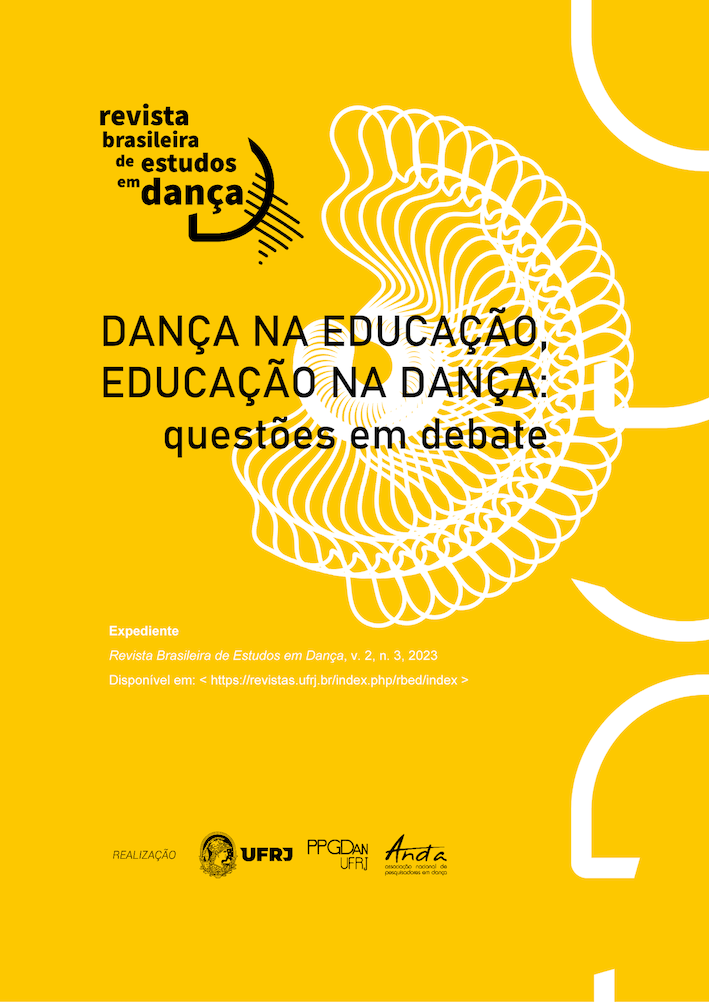GAGA:
in search of the common
DOI:
https://doi.org/10.58786/rbed.2023.v1.n3.55361Abstract
n this text I start from the interest in promoting a reflection on the language of gaga movement, developed through the Israeli choreographer Ohad Naharin, in the early 90's. An artist of interventions, shocks and events proposes in his methodological language and choreographic works the contact with other worlds, where the rules are different. In this way, I use the perspective of observation, experience in workshops, participation in regular classes, analysis of bibliographic and methodological materials, videos, interviews and shows, with the intention of identifying the common that affects their practice.
References
ARENDT, Hannah 1906. A vida do Espírito. 10ª edição. São Paulo: Civilização brasileira, 2009.
BATSHEVA DANCE COMPANY. Disponível em: <https://batsheva.co.il/he/home/>. Acesso em 14 de fevereiro de 2023.
BRANDSTETTER, Gabriele. Dança como cena-grafia do saber. Tradução de Stephan Baumgärtel. Urdimento, nº 19, novembro de 2012.
CANELAS, Luciana. A que sabe um morango? Disponível em <https://www.publico.pt/1999/03/05/jornal/a-que-sabe-um-morango 130437>. Revista Público, acesso em: 05 de março de 1999.
DARDOT, Pierre; LAVAL, Christian. Comum: Ensaio sobre a Revolução no século XXI. Tradução de Mariana Echalar. São Paulo: Boitempo, 2017.
DEMAIZIÉRE, Thierry; TEURLAI, Alban. MOVE: O mundo da dança. Colorido, NTSC, legendado, episódio 2, 47 minutos. França: Netflix, 2020.
ESHEL, Ruth. With New Dance, Batsheva’s Naharin Lives Up tô Expectations. Acesso em <https://www.haaretz.com/israel news/culture/.premium-batshevas-naharin-stays-fresh-withthe-hole 1.5237440> . Apr. 09, 2013.
GAGA. Disponível em: < https://www.gagapeople.com/en/>. Acesso em 14 de fevereiro de 2023.
GAGA.PEOPLE.DANCERS. Disponível em: <https://www.instagram.com/gaga.people.dancers/>. Acesso em 14 de fevereiro de 2023.
GALLILI, Deborah Friends. Going Gaga: My Intro to Dance Classes. Israel: 2008. Disponível em: <https://www.danceinisrael.com/2008/11/going gaga-my-intro-to-gaga-dance/>. Acesso em: 08 mar. 2021.
_____________________. Gaga: Ohad Naharin’s Movement Language, in His Own Words. Dance in Israel: 2008. Disponível em: <https://www.danceinisrael.com/2008/12/gaga-ohad-naharins-movement language-in-his-own-words/>. Acesso em: 28 de dezembro de 2008.
HEYMANN, Tomer. Gaga: O amor pela dança. Colorido, NTSC, legendado, 1 hora e 43 minutos. Paris: Icarus Films, 2017.
HOGSTAD, Ine Terese. Finding Layers in the Gaga Movement Labguage: A study of Lived Experience of the Gaga Movement Language in the Dancing Community Gaga/people at the Suzanne Dellal Center, Tel Aviv. Norway, 2015. 71f. Master thesis dance studies. Department of Music, Dance studies, Nowegian University of Science and Technology Faculty of Humanities, Norway, 2015.
KATAN, Einav. Embodied philosophy in dance: Gaga and Ohad Naharin’s movement research. 1º ed. London: Palgrave Macmillan, 2016.
LAPOUJADE, David. William James, a construção da experiência. Tradução Hortencia Santos Lencastre. São Paulo: n-1 edições, 2017.
_________________. As existências mínimas. Tradução Hotencia Santos Lencastre. São Paulo: n-1 edições, 2017.
LEHMANN, Hans-Thies. Teatro Pós-Dramático. São Paulo: Orfeu Negro. 2017.
MANNING, Erin. O gesto menor. Durham: Duke UP, 2016.
Downloads
Published
Versions
- 2024-05-09 (3)
- 2023-12-01 (2)
- 2023-09-02 (1)
How to Cite
Issue
Section
License
Authors who publish in the Revista Brasileira de Estudos em Dança are
responsible for the content of signed articles and retain copyright.
They grant the journal the right of first publication with the work simultaneously
licensed under the Creative Commons Attribution-NonCommercial 4.0 License
(Open Archives Initiative - OAI). This feature, used for open-access journals,
allows sharing work for non-commercial purposes and acknowledges
authorship. If the text is later published in another vehicle, the author
must inform that it was initially published as an article in the Revista Brasileira
de Estudos em Dança. Therefore, even if the journal owns the first publication,
authors are entitled to publish their work in institutional repositories or on
their personal pages, even if the editorial process has not been completed.
The journal reserves the right to make normative, orthographic, and grammatical changes to maintain the language standard, respecting the authorial style.

